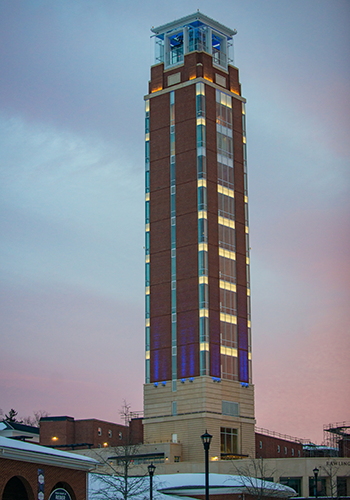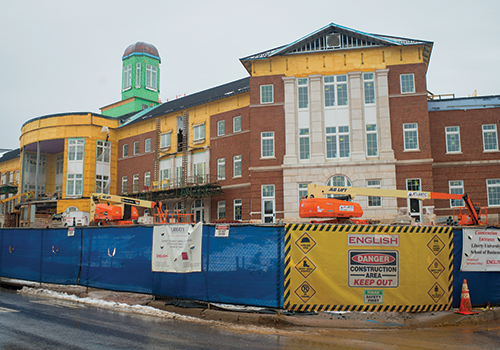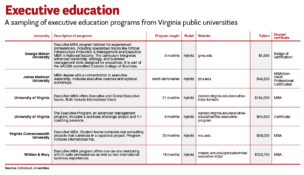Teaching outside the box
Liberty puts a new emphasis on entrepreneurial thinking
Teaching outside the box
Liberty puts a new emphasis on entrepreneurial thinking
Anthony Nobles visited Liberty University for the first time in October to talk about a heart procedure involving one of his inventions.
Students at Liberty’s College of Osteopathic Medicine (LUCOM) listened as Nobles and Dr. Jim Thompson, a cardiac surgeon, described the procedure performed the previous summer at Inova Fairfax Hospital. The patient was a 56-year-old man with a congenital hole in his heart, a condition that could cause a major stroke or death.
Other, more invasive treatments were available, Nobles explained, but the medical team decided instead to use his relatively new NobleStitch — a mechanism that is remotely guided through the vascular system to the heart to sew the hole shut. The invention has been used successfully in the U.S. 130 times without any complications.
At the end of their presentation, Nobles and Thompson revealed the identity of their patient — Liberty President Jerry Falwell Jr. Students gasped and applauded as Falwell appeared on stage, expressing his gratitude to Nobles and Thompson.
Taking the microphone, Falwell encouraged students to take inspiration from Nobles’ invention. If you have an idea, “don’t just dismiss it — try it,” he said. “That’s what has made modern medicine the way it is today, all these brilliant people willing to test ideas out. [They’re] entrepreneurs really.”
Center leader
Nobles, the CEO of HeartStitch Inc. and Nobles Medical Technologies, is coming back to Liberty in 2019 — this time to stay.
The inventor will lead Liberty’s Center for Entrepreneurship, helping it promote an entrepreneurial spirit among students.
“What we really want to do is to teach students how to think like entrepreneurs,” Falwell explains. “Not just to go out and get a job and wait for the end of the week when they get their paycheck, but to really look for ways to add value, to have ideas and pursue them, to take risks, to problem-solve and innovate, to not be afraid to try and fail and try again, because that’s how this school was built — on entrepreneurialism.”
Nobles, who has lectured at many schools, had been looking for a permanent university position. Liberty, he explains, is a perfect fit because it operates more like a startup than an educational institution.
He was impressed with Liberty’s willingness to take risks on innovative ideas during its 47-year history. Today, it is Virginia’s largest university in terms of total enrollment, with 103,388 students (15,105 residential and 88,283 online). Liberty also has more than $3 billion in gross assets, including nearly $1.7 billion in cash reserves.
“I just believe in what they’re doing there. I have a lot to give and I needed a home to do it — and I think Liberty’s that place,” Nobles says.
In addition to teaching and leading the Center for Entrepreneurship, Nobles plans to create a think tank of professors and consultants. It will review students’ business ideas, providing them with advice and resources to launch companies.
Nobles eventually plans to create a HeartStitch research subsidiary, housing it at LUTECH, Liberty’s 28-acre technology park site in Bedford County.
Engineering dean
In another key hire, Mark Horstemeyer has been named dean of Liberty’s engineering school.
Horstemeyer, also an entrepreneur, was a professor at Mississippi State University where he led its Center for Advanced Vehicular Systems. He plans to take Liberty’s engineering school — which has about 700 students — in a new direction, emphasizing research on integrated computational materials engineering.
“The heart of what we’ll be doing is multi-scale modeling and optimization, which means we’ll use high-performance computing and other precise tools to go through and simulate, calibrate, validate and optimize the chemistry, process, material structure and property performance of something, whether it’s a building for civil engineering, a semiconductor for electrical engineering or a car component for mechanical engineering,” he explains.
Liberty plans to break ground on a new engineering school building in 2020 and invest in a $1 million supercomputer.
In the meantime, Horstemeyer is recruiting faculty and doctoral students, with a goal of helping Liberty climb into the top 80 list of engineering schools in eight years and the top 50 five years after that.
The dean is the founder of two startups: Predictive Design Technologies, which performs modeling, simulation and failure analysis of metals and metal structural compounds, and Yobel Technologies, which has a grant from the National Football League to build a better helmet for players. Both companies are likely to be housed at LUTECH.
“Engineers, as a rule, tend to be risk-averse. I know because I was that way for a long time,” Horstemeyer explains. “But we’d like to inspire our engineering students to really weigh out those risks against the benefits that can be gained by thinking creatively within all of the engineering processes. And I think if we do that, there will be a real paradigm shift in the kind of ecosystem we can create.”
The next wave
While these programs take shape, Liberty is wrapping up a $500 million rebuilding project kicked off in 2011, which has reshaped its campus.

Soon to be completed is a new 78,000-square-foot building for the school of business. During the 2017-18 school 
Liberty has kicked off a nationwide search for a new business school dean with both academic and entrepreneurial credentials.
“We are finally starting to slow down on the growing,” Falwell says. “Now we can really focus on strengthening our academics and hiring the deans and building the programs and policies and partnerships that can help us do that.”
Liberty Provost Scott Hicks says all academic programs, not just those in the business school, will teach entrepreneurial basics and offer coursework aligned with fast-changing industry demands. “Our goal is to make our students highly employable, so that they hit the market at a fast trot rather than a crawl,” he says.
For example, Liberty offers six degrees in cybersecurity. “The cyber field has matured to the point where there are different types of cyber jobs,” such as compliance, technology and secure coding, says Allen Harper, executive director of Liberty’s Center for Cyber Excellence. “So we don’t approach it like it’s a one-size-fits-all market.”
Currently, 1,250 Liberty students are studying cyber programs, which are housed in the school of business.
The school’s largest cyber program, a a bachelor’s degree track in IT with data networking and security, was recently named a National Center for Academic
Excellence in Cyber Defense Education by the National Security Administration, the most rigorous and elite credential for this field.
Staying in the know
To strengthen its business relationships, Liberty last summer opened the Office of Outreach and Business Engagement. “We are sort of a front door for companies who need their questions answered or need to be connected to the right resources and don’t really know where to start,” says Jonathan Witt, a university vice president who is in charge of the office.
Liberty is growing its sponsored programs with industry and is in the process of rewriting its intellectual property policy. “Our IP policy is very entrepreneur- and company-friendly and something that’s a game-changer for how we engage with companies,” Whitt explains. “This will only add to our reputation as an entrepreneurial university that’s marketplace-focused.”
Liberty already has developed a number of partnerships with hundreds of companies. For example, the university asked Hendrick Automotive Group to help it develop an automotive dealership management program.
The Center for Entrepreneurship, meanwhile, is giving students a chance to talk with local CEOs with a weekly event, “Meet Up! Start Up!”
The center also offers an eight-week incubator program pairing students with mentors. They help students research the market and create business plans. Each semester, students can pitch their business ideas, earning prize money as part of the school’s “Spark! Tank” competition.
JT Bicket, a 20-year-old finance major, worked with Michael Mullins, founder and CEO of Specialty Communications Inc., to flesh out an idea for a digital strategy company.
“One of the biggest things I learned from him was how to recognize pain points and find a way to create more value for my customers,” the student says.
While Bicket didn’t win the Spark! Tank competition, he already has started a business. His company, Elevate Marketing, provides web design for a number of cybersecurity firms — even as the Liberty sophomore continues to pursue his degree.
<

















